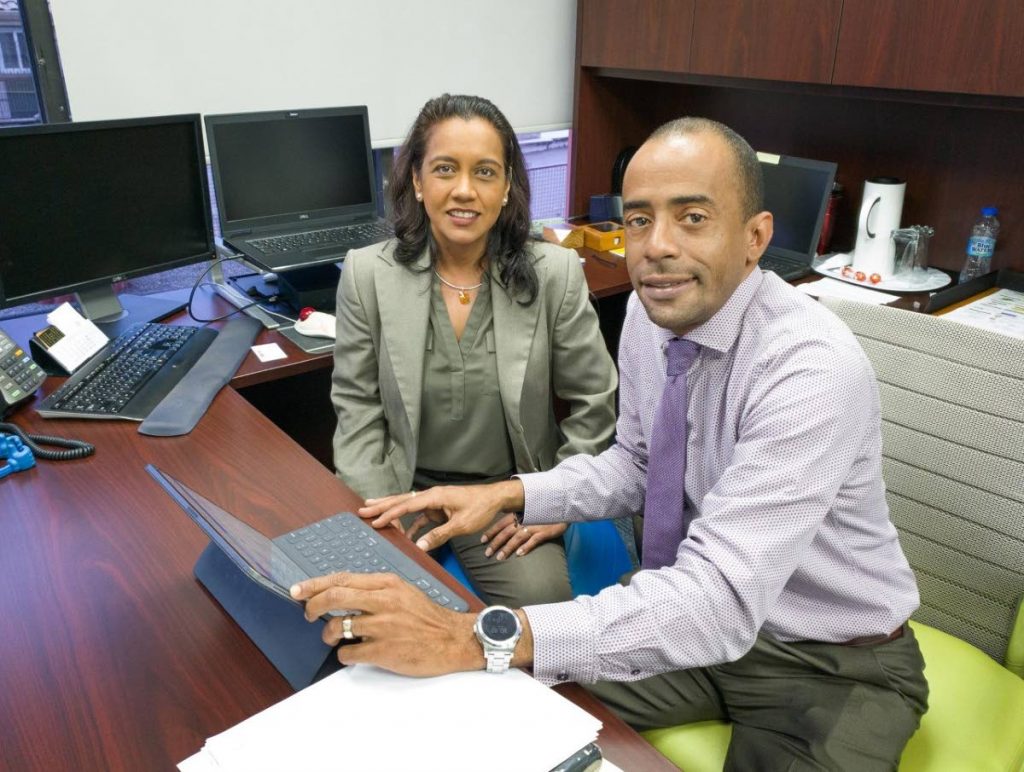Republic invests in fintech

Investing in financial technology (fintech) is another step by Republic Bank to provide real-time digital services to customers. It's the premise of the financial giant's bid for a 19.99 per cent stake in Nobis Baas – a subsidiary of electronic payments group Wipay Holdings Ltd.
“Fintech (companies) are able to come in and develop things at a faster and more agile pace,” said Kwame Blanchfield senior manager, group marketing and communications at Republic.
“Banks, which tend to move slower – even internationally – can benefit from that agility and speed.”
Blanchfield and Denyse Ramnarine, GM, electronic channels and payments division, made themselves available on Monday to discuss the bank’s pending relationship with Nobis.
The intention to acquire shares in Nobis is filed with the Central Bank and Republic is awaiting clearance to proceed with the transaction.
“This is the first time we're doing it (investing in a fintech company), and this is the first time they have had a request like this at the Central Bank,” Ramnarine said, “so I imagine there have been some questions about it.”
What happens once that clearance to invest is granted?
Ramnarine declined to comment.
“We will work on a road map, but at this moment we cannot talk about those plans, at least until the regulator speaks.”
That hasn’t stopped the bank from testing what that relationship could mean for its future. At a recent CPL match, WiPay’s blue payment bracelets were deployed with Republic’s brand to 1,500 cricket fans, preloaded with $50 they could spend with the flick of a digitally-enabled wrist at a dedicated Carib bar.
“Two per cent of the cashless transaction users came back to top up their bands,” Blanchfield said. “They didn’t want to use cash any more.”
To make the project work seamlessly, Republic contracted Kradius – an ICT solutions firm in San Fernando – to amplify the quality of connections within the notoriously signal-defiant stadium.
“It wasn't plug and play,” Blanchfield admitted. “We had to recreate some stuff.”
Carib was able to reconcile its bar accurately at the end of the event and was even able to get a report on consumption at the midpoint of the event.
That particular project, Ramnarine explained, might “start as something to manage cash in events, but one of the challenges is making it an open system, something that can be used anywhere.”
The bracelets seemed a bit bold as wearables go, and likely to conflict with fashion choices for general use.
“We have options for a more neutral colour,” Blanchfield said, “and the wearable will probably take different forms. It could even be a ring.”
“We have seen rings being used. It's faster, easier to use. I wouldn't be too concerned with the bracelet being blue it's the chip that is the business.”
The bank’s enthusiasm for WiPay’s technologies is evident in their conversations about it as well as their willingness to put up hard cash to invest. But where did this romance start?
“The terminal and the software that enables (WiPay’s) terminal system have to pass through a bank, and RBL is that bank,” Ramnarine said.

“We were seeing the opportunities, the possibilities and the capabilities, and that prompted the investment: we saw how we could benefit and they could benefit.”
While Republic has been outsourcing some of its resources, payments are such a core part of the banking business that it wasn’t clear why the bank didn’t just invest in building its own solution.
“Outsourcing wasn't an option in this scenario. They weren't offering a service for that, they had their own plans, and it became an opportunity for partnering,” Ramnarine said. “It was a question of resources and capabilities. Our stance on development has been to outsource as much as possible.
“So much of banking is about payments, and WiPay has their capabilities. They obviously are good at what they do, not just at building, but at conceptualizing and positioning themselves in the market.”
It’s part of a measured and, Ramnarine admits, slow effort at changing the way the bank does business.
The company now has 15 software robots automating routine work, and is looking at introducing more automation for its onboarding processes. These routines run on in-house servers, though the company is slowly embracing cloud technologies.
“We’ve used Office 365 since April 2019, but of course it would have been trialled to death,” Ramnarine said. “There is a question of risk. It took us a little while for the bank to say, let's go.”
The company was also careful to allay staff fears of job losses by introducing the new automation technology strategically and with clear communication.
Now that the staff have seen that the technology reduces tedious work and allows them to spend more time with customers, they are asking for wider deployment, Ramnarine said.
“Some banks might have gone gung-ho, but we have taken the position of being cautious,” she said.
But that pace may accelerate as banking support systems increasingly take advantage of cutting-edge technologies.
“More companies are building their software to run on the cloud, and there are vendors who have announced that they are sunsetting their on-premise products and are moving them to the cloud,” Blanchfield said.
“There is a strategy aspect, and there is a stay-in-business aspect as well,” Ramnarine said. “We need to address the needs of the customer.”


Comments
"Republic invests in fintech"